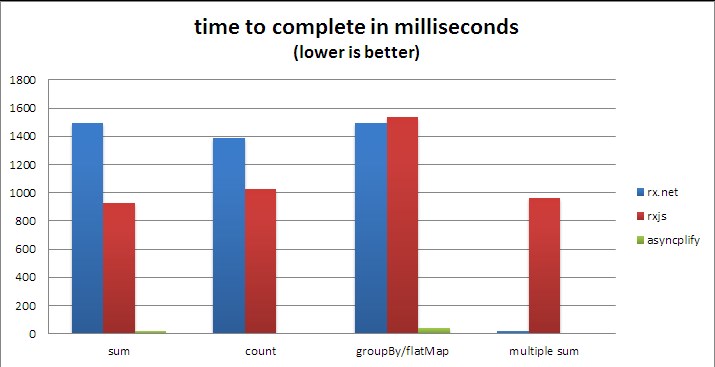Contents
Introduction
Last year, I’ve worked on a projet requiring lots of calculations to calculate financial indicators. The amount of data to process was huge. I managed to get it worked using Rx.Net. Coming from a .Net/C# background, it was a natural fit.
After a year of working on nodejs and angularjs, I felt in love with javascript. I decided test rxjs but the performance was not convincing me. I decided to implement my own framework based on rxjs but with performance in mind.
The asyncplify framework was born.
Machine
- Microsoft Windows 8.1 Pro 64Bit
- Intel i7 2.20GHz
- 12 GB Memory
- .Net Framework 4.5.1
- nodejs 0.12.4
Results

Tables
| rx.net | rxjs | asyncplify | |
|---|---|---|---|
| sum | 1497ms | 930ms | 19ms |
| count | 1360ms | 1024ms | 5ms |
| groupBy/flatMap | 1491ms | 1538ms | 37ms |
| multiple sum/subscribe | 21ms | 961ms | 3ms |
Code used for the test
rx.net code
using System;
using System.Diagnostics;
using System.Reactive.Linq;
namespace ConsoleApplication1
{
class Program
{
static void Main(string[] args)
{
var w = Stopwatch.StartNew();
Observable
.Range(0, 1000000)
.Sum(v => (long)v)
.Subscribe(x => Console.WriteLine("sum = {0} in {1}ms", x, w.ElapsedMilliseconds));
w.Restart();
Observable
.Range(0, 1000000)
.Count()
.Subscribe(x => Console.WriteLine("count = {0} in {1}ms", x, w.ElapsedMilliseconds));
w.Restart();
Observable
.Range(0, 1000000)
.GroupBy(x => x % 10)
.SelectMany(g => g)
.Subscribe(_ => { }, () => Console.WriteLine("groupBy/flatMap in {0}ms", w.ElapsedMilliseconds));
w.Restart();
for (var i = 0; i < 1000; i++)
{
Observable
.Range(0, 10)
.Sum()
.Subscribe();
}
Console.WriteLine("multiple sum {0}ms", w.ElapsedMilliseconds);
Console.ReadLine();
}
}
}Used Rx.net version 2.2.5. I have compile this code using visual studio .net 2013 in release mode and start the program without a debugger attached.
rxjs code
var rx = require('rx').Observable;
var d = new Date();
rx
.range(0, 1000000)
.sum()
.subscribe(function (x) { console.log('sum = %d in %dms', x, new Date() - d); });
d = new Date();
rx
.range(0, 1000000)
.count()
.subscribe(function (x) { console.log('count = %d in %dms', x, new Date() - d); });
d = new Date();
rx
.range(0, 1000000)
.groupBy(function (x) { return x % 10; })
.flatMap(function (g) { return g; })
.subscribe(function () {}, function () {}, function () { console.log('groupBy/flatMap in %dms', new Date() - d); });
d = new Date();
for (var i = 0; i < 1000; i++) {
rx
.range(0, 1000)
.sum()
.subscribe();
}
console.log("multiple sum in %dms", new Date() - d);used rx version 2.5.3
asyncplify code
var asyncplify = require('asyncplify');
var d = new Date();
asyncplify
.range(1000000)
.sum()
.subscribe(function (x) { console.log('sum = %d in %dms', x, new Date() - d); });
d = new Date();
asyncplify
.range(1000000)
.count()
.subscribe(function (x) { console.log('count = %d in %dms', x, new Date() - d); });
d = new Date();
asyncplify
.range(1000000)
.groupBy(function (x) { return x % 10; })
.flatMap(function (g) { return g; })
.subscribe({ end: function () { console.log('groupBy/flatMap in %dms', new Date() - d); } });
d = new Date();
for (var i = 0; i < 1000; i++) {
asyncplify
.range(10)
.sum()
.subscribe();
}
console.log("multiple sum in %dms", new Date() - d);used asyncplify version 0.4.2
Conclusion
We can see that asyncplify is fast, faster than the 2 other rx framework. rxjs is in most case faster than rx.net but when using many rxjs subscription, rx.net is faster than rxjs. After seeing such positive result, I will continue to develop asyncplify.
God bless you… Dany


